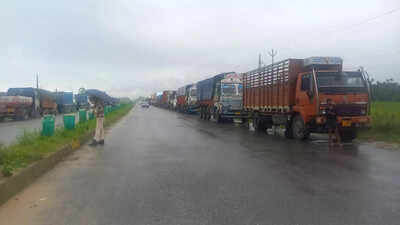ARTICLE AD BOX

Economic blockade in Tinsukia
Dibrugarh:
The Moran community on Monday launched an indefinite economic blockade in Tinsukia district, bringing transportation of vital resources including oil, coal, tea, and timber, to a complete standstill.
They demanded Scheduled Tribe status and constitutional upgrades for their autonomous council.The blockade, spearheaded by the All Moran Students’ Union (Amsu) with support from six other Moran organisations, created massive disruptions along the national highway, with long queues of trucks and oil tankers stranded as protesters prevent their movement through the district.“We have been demanding ST status since the time of the AGP and Congress govts. In 2014, we saw a ray of hope when PM Narendra Modi promised us ST status, but once again our community has been ignored.
We have been patient for long but our patience has run out. The economic blockade will continue indefinitely until the govt does something concrete,” said Palindra Borah, president of the All Moran Students’ Union, who was present at the blockade site alongside general secretary Joykanta Moran and other community leaders.The community’s demands centre around two critical issues — recognition as a ST and elevation of the Moran Autonomous Council from its current statutory status to the more powerful Sixth Schedule framework under the Constitution.
The agitation stems from unfulfilled commitments dating back to the BJP’s 2014 election campaign, when they pledged to grant ST designation to six indigenous communities — Morans, Tai Ahoms, Mottocks, Koch Rajbongshis, Sooteas, and Tea Tribes. A full decade later, these groups continue to be excluded from the coveted ST list, despite repeated assurances from political leaders. The delay has created growing resentment among these communities, who feel marginalised despite their indigenous status.“Ten years have passed since that promise was made, yet we remain classified as other backward classes. ST status would provide us with enhanced constitutional protections and benefits that our community desperately needs for development and cultural preservation,” Joykanta Moran said.Beyond ST recognition, the Morans are demanding constitutional parity through elevation of their autonomous council. Currently, Assam operates a two-tier autonomous governance system that creates stark disparities in power and protection between different indigenous communities.While three councils — the Bodoland Territorial Council, Dima Hasao Autonomous District Council, and Karbi Anglong Autonomous District Council — enjoy comprehensive Sixth Schedule status with robust powers and constitutional safeguards, seven Statutory Autonomous Councils, including the Moran council, operate under restrictive state legislation.The indefinite nature of Monday’s blockade signals the community’s determination to maintain pressure until their demands are addressed.
The strategic location of Tinsukia district, a prominent commercial hub, through which crucial resources flow to other parts of the region, makes the economic blockade particularly impactful. The disruption affects not only local commerce but also broader regional supply chains, as essential commodities remain stranded on highways.
Oil companies, tea estates, and timber businesses are likely to face significant losses if the blockade continues.State authorities have yet to announce any formal response to the community’s demands, but the scale and economic impact of the blockade may force urgent negotiations to resolve the decade-old grievance that continues to fuel indigenous unrest in Assam.



.png)
.png)
.png)
















 1 hour ago
4
1 hour ago
4









 English (US) ·
English (US) ·